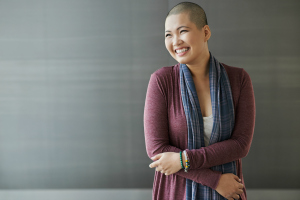Special Therapy Addresses Body Image in Breast Cancer Survivors

Researchers in Canada have developed a promising program that aims to help breast cancer survivors with body image.
Restoring Body Image After Cancer (ReBIC) is a group therapy approach that combines guided imagery with talk therapy in a supportive environment.
Body image concerns are common in breast cancer survivors, who are adjusting to a body that isn’t quite the same as it was before cancer. Women may have lost one or both breasts to surgery or their hair to chemotherapy. Removal of lymph nodes can lead to lymphedema – a swelling of the arms or legs. Treatment can trigger early menopause as well.
The research team tested their program with 194 women and published their findings in January in the Journal of Clinical Oncology.
The women’s ages ranged from 18 to 65. They had all been diagnosed with invasive breast cancer, but the disease had not spread to other parts of the body. All their treatments – surgery followed by chemotherapy and radiation – and had been cancer-free for two years.
The women were randomly assigned to one of two groups.
One hundred thirty-one women attended ReBIC sessions once a week for eight weeks. The therapy included guided imagery, a type of visualization process, during which women used their imagination to process their situation with their senses. The women also shared their feelings and experiences and received information and reading materials related to body image and breast cancer.
The remaining 63 women were given reading materials but did not participate in the group therapy.
All the women were followed for one year, periodically completing questionnaires about body image, sexuality, and quality of life.
Over time, the women in the therapy group tended to feel more comfortable with their bodies and felt less body stigma than the women who received no therapy. After one year, the ReBIC group reported a better cancer-related quality of life, too.
The groups had similar results for sexual function assessments.
Right now, the ReBIC is located mainly in the Toronto area, but the researchers hope to offer it in other areas eventually. They say it can be adapted easily in both cancer centers and primary care settings.
In the meantime, cancer survivors who are troubled by any unease with their bodies should talk to their care team. A doctor can usually make a referral to a counselor who specializes in post-cancer body image concerns.
Resources
BreastCancer.org
“Program Can Help Ease Body Image Concerns and Improve Quality of Life”
(February 1, 2018)
http://www.breastcancer.org/research-news/easing-body-image-concerns-and-improving-qol
Journal of Clinical Oncology
Esplen, Mary Jane
“Restoring Body Image After Cancer (ReBIC): Results of a Randomized Controlled Trial”
(Abstract. Published online before print: January 22, 2018)
http://ascopubs.org/doi/full/10.1200/JCO.2017.74.8244
MedwireNews.com
“Psychosocial intervention helps improve post-cancer body image”
(January 30, 2018)
https://www.medwirenews.com/breast-cancer/oncology/psychosocial-intervention-helps-improve-post-cancer-body-image/15422946
You may also be interested in...
Other Popular Articles

What Is the Average Penis Size?
If you have ever wondered how your penis compares to others in terms of size, you are not alone. Many men are curious to know how their penises stack up compared to the average. Unfortunately, general curiosity can sometimes give way to full-on obsession and anxiety about penis size. This can be an unhealthy and often unnecessary fixation, especially because most men who think their penises are too small have perfectly normal-sized penises.

What Is Jelqing, and Does It Actually Work?
The term “jelqing” refers to a set of penis stretching exercises that some believe can make the penis bigger. Although the practice has gained attention and popularity in blogs and internet forums in recent years, there is no scientific evidence that it is an effective way to permanently increase the size of one’s penis. In fact, in some cases, jelqing may actually cause damage to the penis, so it is a good idea to get all the facts before setting off to try it.

What Is Sensate Focus and How Does It Work?
Sensate focus is a technique used to improve intimacy and communication between partners around sex, reduce sexual performance anxiety, and shift away from ingrained, goal-oriented sexual patterns that may not be serving a couple.

Can Sex Reduce Menstrual Cramps?
The SMSNA periodically receives and publishes ‘guest editorials.’ The current article was submitted by Mia Barnes, a freelance writer and researcher who specializes in women's health, wellness, and healthy living. She is the Founder and Editor-in-Chief of Body+Mind Magazine.
Having sex while you experience menstrual cramps is healthy and can provide significant benefits. While it might not be the first activity that comes to mind when your PMS or period cramping begins, many people enjoy sex to reduce menstrual cramps, experience increased pleasure and benefit from other advantages. Learn more about having sex while menstrual cramps are happening and how it can help your body.

How Long Does It Take the Average Man to Ejaculate?
On average, it takes a man between 5 to 7 minutes to orgasm and ejaculate during sexual intercourse.

Can Sex Throw off Your Vaginal pH Balance?
The SMSNA periodically receives and publishes ‘guest editorials.’ The current article was submitted by Mia Barnes, a freelance writer and researcher who specializes in women's health, wellness, and healthy living. She is the Founder and Editor-in-Chief of Body+Mind Magazine.
Your vagina is a pretty powerful organ. It is a pathway for menstrual blood and babies. It also is a main player in sexual intercourse. You might hear about your vagina’s pH and worry that yours is at risk. Here’s what to know about vaginal pH, including the impacts sex could have.
You are prohibited from using or uploading content you accessed through this website into external applications, bots, software, or websites, including those using artificial intelligence technologies and infrastructure, including deep learning, machine learning and large language models and generative AI.

